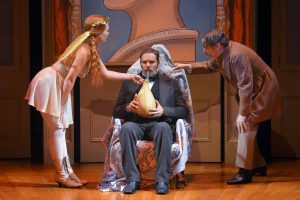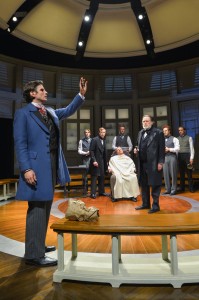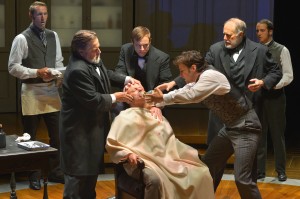There’s Plenty Pain Inside La Jolla Playhouse “Ether Dome”
Two hundred years ago, the best surgeons were the fastest. The man who could remove a festering leg in less than three minutes ruled the hospital, not only with skill but also brute strength and the ability to ignore the desperate, messy agonies of the patient.
The arrival of trustworthy anesthesia – mainly ether – revolutionized medicine in ways just as basic as the taming of infections. But the latter required a lot of science. Ether, and associated compounds like nitrous oxide and chloroform, had been there all the time, ignored by those who needed it most.

Michael Bakkensen tries medicine-show laughing gas assisted by Hannah Tamminen, left, and Lee Sellars in La Jolla Playhouse Ether Dome. Kevin Berne Photos
This odd reality, and the complicated way it played out, is the subject of Ether Dome, a new play by Elizabeth Egloff now at the La Jolla Playhouse.
In this busy theatrical summer, we were due for a truly awful disaster and now, the La Jolla Playhouse has delivered.
Pain comes in many forms. While onstage representations of pulled teeth, dug out tumors and chopped off gangrenous limbs play out in lurching horror, a helpless audience is left with no relief. There’s one intermission available for fleeing this train wreck but for those whose duty requires full attendance, the several stiff Scotches than will finally sooth seem far off in the future.

Tom Paterson introduces ether to Massachusetts General Hospital in La Jolla Playhouse Ether Dome. Kevin Berne Photos
The costumes, by David C. Woolard, seem about right. James Youmans’ scenery is sleek, polished and flexible. David Lander’s lighting enables everything to be seen, sometimes too clearly. One scene features some amusing live sound effects.
But that’s about it on the positive side.
The story here is complicated and elusive. Apparently several people claimed credit for identifying the possibilities of ether and most of them had their points. The man who actually introduced the use of the compound in a demonstration at Boston’s Massachusetts General Hospital in 1846 was a charlatan who had ripped off the ideas of others. A Hartford dentist who demonstrated the use of “laughing gas” that year and an experimental-minded surgeon at Mass General who introduced the idea of ether both got pushed aside into misery by circumstances and a lack of hustle. The establishment drew itself up in snobbery and professional pride to reject outside input. Egloff, the author, wades through all this, combining characters and seeking some clear path.
She never finds one. None of the characters seem worthy of resect. Vivid peripheral characters are introduced and then disappear. Other characters are stretched to fill the needs of exposition. Tangential stories suck up time and go nowhere. Despite some name-dropping – Ralph Waldo Emerson, President Polk it’s ever made clear what year we’re in, until somebody drops a date.
Scenes burdened with plot points are handled with jackhammer touch. Some of this is the responsibility of the director, Michael Wilson, but most of it is just clumsy writing. There are few possibilities in a scene such as the one where the dentist, visiting Paris, shares hits of chloroform with two locals, discussing the latest gossip in accented English that would make Pepe le Pew proud.

Walker Hare, Richmond Hoxie, Lee Sellars, Gregory Balla, Tom Patterson, Bill Kux and Kevin Hafso-Koppman, left to right, in La Jolla Playhouse Ether Dome.
Scuffles break out now and then, to little effect. Some medical trauma is introduced in gagging detail, again with scant result. There’s a nagging suspicion that most of this business could have been worked out through calm conversations and rational compromise. The reasons that it apparently was not are the story this play should be telling. And does not.
The actors mostly look right, though none of them manage to establish a character of continuing interest. Richmond Hoxie plays the big shot with authority, usually calm but capable of rage. Tom Patterson makes the con man cagey and quick but not the buccaneer his record suggests. Michael Bakkensen mostly dithers as the idealistic dentist while William Youmans fumes and flutters as the dreamy surgeon who faints around blood. (There’s something about how he actually invented telegraphy only to have Morse steal the patent. Huh?)
Amelia Pedlow and Liba Vaynberg play a couple of proper wives, to little effect, while Linda Libby is believable as a society lady who provides useful fill for chinks in the story.
Somewhere in all this shouting lies a fascinating story. To tell it effectively, though, it needs to be trimmed, shaped and adapted into a coherence not now present. I have no doubt that every aspect of this play – and much more can be supported by the accuracy of the author’s research.
But maybe that’s the problem. The underbrush of history is obscuring the tree trunk of truth.
[box] ContInues at 7:30 p.m. Tuesdays and Wednesdays, 8 p.m. Thursdays-Saturdays, 2 p.m. Saturdays and Sundays and 7 p.m. Sundays through Aug. 8, 2014.[/box]

Welton Jones has been following entertainment and the arts around for years, writing about them. Thirty-five of those years were spent at the UNION-TRIBUNE, the last decade was with SANDIEGO.COM.



so very nice